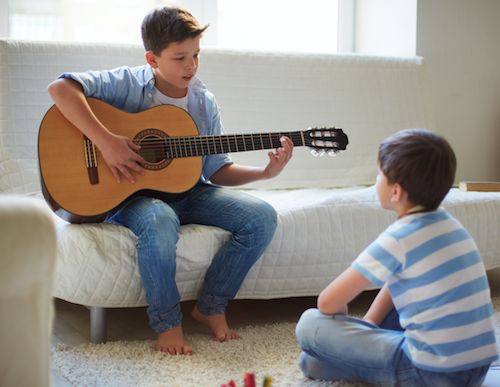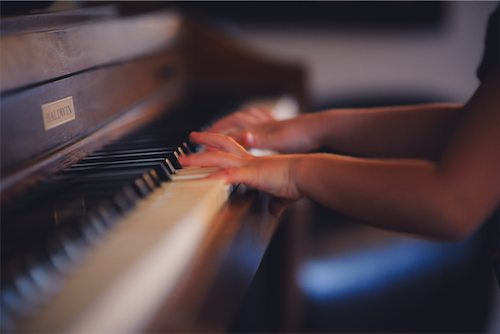Several studies have shown that education in music has an incredible impact on the developing mind. There is a body of research that identifies a “window of opportunity” for children from the age 0 to 9 years to develop a musical sensibility. During this period, the mental mechanism and structures which are responsible for processing and understanding music are in their principal stages of development. This makes it important to start giving children within this age range early music lessons.
As a result, parents from different places all over the world are enrolling their young ones in one music program or another. Despite the high number of child enrollment in music programs, most parents still don’t know the appropriate age for their children to start music lessons.
So what is the best age to start music lessons? You probably already guessed this, but it’s true: there is no one right answer, since every child is different. However, you can determine what that age is for your child by considering a couple factors.

1. Attention span
Firstly, focus is a very important characteristic a child must possess before starting music lessons. You need to consider the ability of your child to focus attention on a particular task. He or she should be able to remain focused or pay attention for a minimum of fifteen minutes. Most music lessons take up to thirty to sixty minutes, sometimes separated into portions of listening, playing and other forms of learning. Therefore, if your child can’t stay focused for ten to fifteen minutes, he/she may be too young to get the most out of music lessons. There is the option of more general music classes made for younger children (3-4) to expose them to music, which might be a better option than starting study of an instrument at this age.
2. Instrument
The age at which a child can begin music lessons can also depend on the type of instrument he/she is interested in. For instance, piano lessons can be started as early as 3-4 years while music lessons on other instruments like drums, the guitar, and saxophone aren’t recommended until seven years or older. This is because the learning curve may be steeper to begin the instrument and also because of the size of the instrument. However, these aren’t rules set in stone. For example, a child might already be more agile and tall and is able to start guitar lessons a year or two earlier (hands are wide enough to reach chords, etc.). It is also important to note that many larger instruments (e.g. upright bass) have student versions of the instruments in smaller sizes. If there is an instrument your child wants to learn but you think might be too big, research to see if there are sizes that accommodate your child. If there are sizes that fit your child, chances are they’re ready to start learning it!

3. You and your child’s musical goals
Sometimes, the goal of the music lessons for young children determines the best age to start. Most of the time, very young children are exposed to musical instruments not because their parents or teachers want them to master them, but simply to learn and develop a meaningful relationship with music. If this is what you want achieve, then early music lessons don’t have to be formal. It can start and should begin soon after birth and within the child’s first few years.
From birth to about 2 years old, since the goal is not for the child to master a particular instrument, you can start giving the child informal music lessons by engaging the child in a musical atmosphere. This can be achieved with simple movement activities like swaying or dancing while holding your child. It can also be achieved by engaging your child in musical games or by playing a musical instrument for him/her.
At 3 years old, it is time to formalize the music lessons. The goal at this age is still not to master an instrument but to develop the child’s skills. These skills may include identifying melody, identifying musical instruments or identifying a beat in music. This is the right time for kids to begin their music experience. There are several musical programs designed for children aged 3 to 4. These programs usually last between 30 to 35 minutes and can be found in preschool classes, churches or community centers. Ensure your goal coincides with that of the musical class in order to decide whether the class is suitable for your child or not.
By 5 years old, they have built a foundation for formalized music lessons. This is the ideal age for group or individual piano/violin lessons. Piano and violin are the two commonly played instruments at the age of five but there have been reports of success with guitar, recorder and ukulele. At this stage, some piano instructions will provide a foundation for basic music concept such as music alphabets, quarter note, half note or whole note. Programs like KidzRock utilize smaller and simplified versions of keyboards and guitar to keep children engaged and excited.
From 7 years old and on, the child would have developed a variety of skills that are related with their choice of instrument. Instruments such as drums, guitar, string instruments and woodwinds are mor easily obtainable for this age group. Most of the basic musical concepts that have been learned from the piano lessons will be mastered. Also, children 7 years and older will have the physical strength to try different bigger instruments that require more strength and stamina. At this point, the goal of lessons should shift from just gaining musical experience to learning and mastering the art of music as well as improving performance ability.

Consider starting with piano first
Children who earlier in their life have had piano lessons already understand many musical elements and can easily change to other instruments. Much of the struggle of learning music is learning the language. But, good news! Most of the language, terms, and note-reading are the same in piano as it is with other instruments such as woodwinds. The method of reading music can differ in terms of clefs (e.g. viola music can be in alto clef vs. piano music being in treble and bass clef), or guitars have tabs and drums have a whole other thing of their own, for example. However, knowing notes, keys, and rhythm is pretty universal through most instruments, so it’s still valuable to start early with piano, which allows young children to cover all of these!